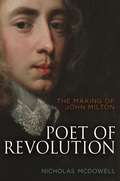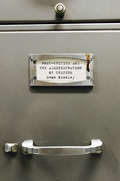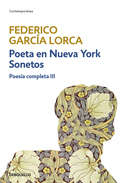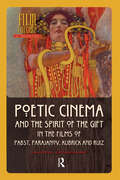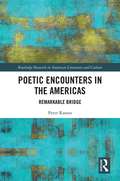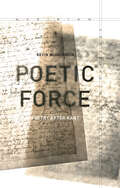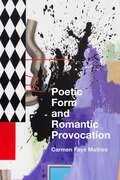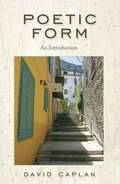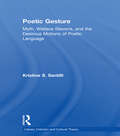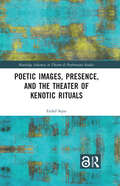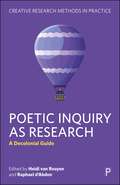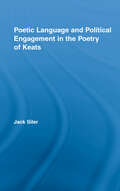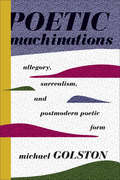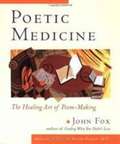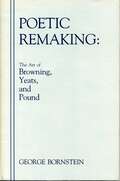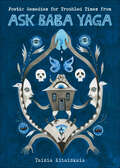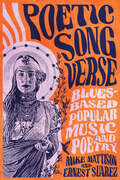- Table View
- List View
Poet of Revolution: The Making of John Milton
by Nicholas McDowellA groundbreaking biography of Milton’s formative years that provides a new account of the poet’s political radicalizationJohn Milton (1608–1674) has a unique claim on literary and intellectual history as the author of both Paradise Lost, the greatest narrative poem in English, and prose defences of the execution of Charles I that influenced the French and American revolutions. Tracing Milton’s literary, intellectual, and political development with unprecedented depth and understanding, Poet of Revolution is an unmatched biographical account of the formation of the mind that would go on to create Paradise Lost—but would first justify the killing of a king.Biographers of Milton have always struggled to explain how the young poet became a notorious defender of regicide and other radical ideas such as freedom of the press, religious toleration, and republicanism. In this groundbreaking intellectual biography of Milton’s formative years, Nicholas McDowell draws on recent archival discoveries to reconcile at last the poet and polemicist. He charts Milton’s development from his earliest days as a London schoolboy, through his university life and travels in Italy, to his emergence as a public writer during the English Civil War. At the same time, McDowell presents fresh, richly contextual readings of Milton’s best-known works from this period, including the “Nativity Ode,” “L’Allegro” and “Il Penseroso,” Comus, and “Lycidas.”Challenging biographers who claim that Milton was always a secret radical, Poet of Revolution shows how the events that provoked civil war in England combined with Milton’s astonishing programme of self-education to instil the beliefs that would shape not only his political prose but also his later epic masterpiece.
Poet's Journal (Amplify Core Knowledge Language Arts, Grade 4 #Unit 3)
by Amplify EducationNIMAC-sourced textbook
Poet's Journal (Amplify Core Knowledge Language Arts, Grade 5 #Unit 3)
by Amplify EducationNIMAC-sourced textbook
Poet's Journal: Grade 5 Unit 3 (CKLA #First Edition)
by Amplify Education Inc.POET'S JOURNAL GRADE 5 UNIT 3
Poet-Critics and the Administration of Culture
by Evan KindleyAfter the 1929 crash, Anglo-American poet-critics grappled with the task of legitimizing literature for public funding and consumption. Modernism, Evan Kindley shows, created a new form of labor for writers to perform and gave them unprecedented say over the administration of culture, with consequences for poetry’s role in society still felt today.
Poeta en Nueva York | Sonetos (Poesía completa #3)
by Federico García LorcaPoeta en Nueva York | Sonetos es el tercer volumen de la Biblioteca Federico García Lorca y el tercero de los que compilan su «Poesía completa». En este libro, amén del impresionante poemario Poeta en Nueva York, se presentan las obras Tierra y luna, los Poemas sueltos II y III, Poemas en prosa, Diván de Tamarit, Sonetos, Seis poemas galegos y el Llanto por Ignacio Sánchez Mejías. Asimismo, se ofrecen las conferencias de Un poeta en Nueva York, Cómo canta una ciudad de noviembre a noviembre y el Ensayo o poema sobre el toro en España. La edición y los prólogos a cargo de Miguel García-Posada, permiten al lector acercarse a la complejidad de su obra y disfrutar, a lo largo de los siete volúmenes que componen esta Biblioteca Federico García Lorca, de uno de los autores españoles más relevantes del siglo XX. Luis Cernuda escribió...«Por esto te mataron, porque erasverdor en nuestra tierra áriday azul en nuestro oscuro aire.» --------------------------------------------------------------------------BIBLIOTECA FEDERICO GARCÍA LORCA Poesía competa:1. Libro de poemas | Primeras canciones | Canciones2. Romancero gitano | Poema del cante jondo3. Poeta en Nueva York | Sonetos Teatro completo:4. La zapatera prodigiosa | Mariana Pineda5. El público | Así que pasen cinco años6. Bodas de sangre | Yerma7. La casa de Bernarda Alba | Doña Rosita la soltera--------------------------------------------------------------------------
Poetic Cinema and the Spirit of the Gift in the Films of Pabst, Parajanov, Kubrick and Ruiz (Film Culture in Transition)
by Laleen JayamannePoetic Cinema and the Spirit of the Gift in the Films of Pabst, Parajanov, Kubrick and Ruiz explores the poetic thinking of these master filmmakers. It examines theoretical ideas, including Maori anthropology of the gift and Sufi philosophy of the image, to conceive film as abundant gift. Elaborating on how this gift may be received, this book imagines film as our indispensable mentor - a wild mentor who teaches us how to think with moving images by learning to perceive evanescent forms that simply appear and disappear.
Poetic Community
by Stephen VoycePoetic Community examines the relationship between poetry and community formation in the decades after the Second World War. In four detailed case studies (of Black Mountain College in North Carolina, the Caribbean Artists Movement in London, the Women's Liberation Movement at sites throughout the US, and the Toronto Research Group in Canada) the book documents and compares a diverse group of social models, small press networks, and cultural coalitions informing literary practice during the Cold War era.Drawing on a wealth of unpublished archival materials, Stephen Voyce offers new and insightful comparative analysis of poets such as John Cage, Charles Olson, Adrienne Rich, Kamau Brathwaite, and bpNichol. In contrast with prevailing critical tendencies that read mid-century poetry in terms of expressive modes of individualism, Poetic Community demonstrates that the most important literary innovations of the post-war period were the results of intensive collaboration and social action opposing the Cold War's ideological enclosures.
Poetic Encounters in the Americas: Remarkable Bridge (Routledge Research in American Literature and Culture)
by Peter RamosPoetic Encounters in the Americas: Remarkable Bridge examines the ways in which U.S. and Latin American modernist canons have been in cross-cultural, mutually enabling conversation, especially through the act of literary translation. Examining eighteen U.S. and Latin American poets, my book is one of the few works of criticism to present case studies in U.S. and Latin American poetries in dialogues that highlight the social life and imaginative encounters obtained through methodologies of translation and innovations in poetic technique.
Poetic Ethics in Proverbs
by Anne W. StewartThe Book of Proverbs' frequent use of binary oppositions - righteous and wicked, wise and foolish - has led many to assume that its vision of the moral world is relatively simplistic. This study demonstrates that Proverbs in fact presents a remarkably sophisticated response to ethical questions of profound concern to the Israelite sages who crafted the book: what motivates human beings? How do they learn? How does the power of desire shape human characters? Anne W. Stewart analyzes Proverbs' multifaceted collection of images and metaphors to reveal their complex understanding of the development of the moral self, which suggests that character formation requires educating all of the senses and not simply the cognitive faculties. One of few works to make explicit connections between the poetic form of Proverbs and its pedagogical function, Poetic Ethics in Proverbs will appeal to all those interested in literary approaches to the Bible.
Poetic Force: Poetry After Kant
by Kevin MclaughlinThis book argues that the theory of force elaborated in Immanuel Kant's aesthetics (and in particular, his theorization of the dynamic sublime) is of decisive importance to poetry in the nineteenth century and to the connection between poetry and philosophy over the last two centuries. Inspired by his deep engagement with the critical theory of Walter Benjamin, who especially developed this Kantian strain of thinking, Kevin McLaughlin uses this theory of force to illuminate the work of three of the most influential nineteenth-century writers in their respective national traditions: Friedrich Hölderlin, Charles Baudelaire, and Matthew Arnold. The result is a fine elucidation of Kantian theory and a fresh account of poetic language and its aesthetic, ethical, and political possibilities.
Poetic Form and Romantic Provocation
by Carmen Faye MathesCritics have long understood the development of Romantic aesthetics as a turning point in the history of literary theory, a turn that is responsible for theories of mind and body that continue to inform our understandings of subjectivity and embodiment today. Yet the question of what aesthetic experience can "do" grates against the fact that much Romantic writing represents subjects as not actually in charge of the feelings they feel, the dreams they dream, or the actions they take. In response to this dilemma, Poetic Form and Romantic Provocation argues that being moved contrary to one's will is itself an aesthetic phenomenon explored by Romantic poets whose experiments with poetic form and genre provoke unanticipated feelings through verse. By analyzing how Romantic poets intervene, affectively and aesthetically, in readerly expectations of form and genre, Mathes shows how provocations disrupt and invite, disturb and compel—interrupting or suspending or retreating in ways that ask readers to orient themselves, materially and socially, in relation to literary experiences that are at once virtual and embodied. Examining the formal tactics of Charlotte Smith, William Wordsworth, Samuel Taylor Coleridge, John Keats, and Percy Bysshe Shelley, alongside their reactions to historical events such as Toussaint Louverture's revolt and the Peterloo Massacre, Mathes reveals that an aesthetics of radical openness is central to the development of literary theory and criticism in Romantic Britain.
Poetic Form: An Introduction
by David CaplanWriting exercises challenge students to utilize the forms in creative expression. Covering a wider range of forms in greater detail and with more poetic examples than similar guides on the market, it provides enough material to thoroughly introduce the language's major forms while allowing flexibility in the classroom.
Poetic Gesture: Myth, Wallace Stevens, and the Desirous Motions of Poetic Language (Literary Criticism and Cultural Theory)
by Kristine S. SantilliFirst Published in 2003. Routledge is an imprint of Taylor & Francis, an informa company.
Poetic Images, Presence, and the Theater of Kenotic Rituals (Routledge Advances in Theatre & Performance Studies)
by Eniko SepsiThis book explores the interrelation of contemporary French theatre and poetry. Using the pictorial turn in the various branches of art and science, its observable features, and the theoretical framework of the conceptual metaphor, this study seeks to gather together the divergent manners in which French poetry and theatre address this turn. Poetry in space and theatricality of poetry are studied alongside theatre, especially to the performative aspect of the originally theological concept of "kenosis". In doing so the author attempts to make use of the theological concept of kenosis, of central importance in Novarina’s oeuvre, for theatrical and dramatological purposes. Within poetic rituals, kenotic rituals are also examined in the book in a few theatrical practices – János Pilinszky and Robert Wilson, Jerzy Grotowski and Eugenio Barba – facilitating a better understanding of Novarina’s works. Accompanied by new English translations in the appendices, this is the first English language monograph related to the French essayist, dramaturg and director Valère Novarina’s theatre, and will be of great interest to students and scholars in theatre and literature studies.
Poetic Inquiry as Research: A Decolonial Guide (Creative Research Methods in Practice)
by Heidi van Rooyen and Raphael d’AbdonPoetic inquiry is an arts-based approach integrating the humanities and sciences to enhance the quality of social science research and its dissemination. This insightful guide sheds light on the transformative power of poetic inquiry in academic research. Blending poetry with scholarly work, it offers practical advice on crafting research poems, distinguishing them from literary poems and determining when and how to incorporate them into your studies. The book: - helps researchers to explore and express their research creatively; - emphasises diverse and decolonial viewpoints and paths to knowledge; - features methods, case studies, prompts and exercises from the Global South and North. Perfect for researchers eager to explore new dimensions of expression, this guide enriches all aspects of the research process.
Poetic Language and Political Engagement in the Poetry of Keats (Studies in Major Literary Authors)
by Jack L. SilerIn this incisive volume Siler traces the uneasy relationship between the content of Keats' poems and social history. In the process, he discovers that the early poems are linked with the mission statement of the radical journal Annals of the Fine Arts, whilst the poems after Endymion reveal a poet more concerned with the nature of poetic representation--its why and wherefore.
Poetic Machinations
by Michael GolstonThe shape, lineation, and prosody of postmodern poems are extravagantly inventive, imbuing their form with as much meaning as their content. Through a survey of American poetry and poetics from the end of World War II to the present, Michael Golston traces the proliferation of these experiments to a growing fascination with allegory in philosophy, linguistics, critical theory, and aesthetics, introducing new strategies for reading American poetry while embedding its formal innovations within the history of intellectual thought.Beginning with Walter Benjamin's explicit understanding of Surrealism as an allegorical art, Golston defines a distinct engagement with allegory among philosophers, theorists, and critics from 1950 to today. Reading Fredric Jameson, Angus Fletcher, Roland Barthes, and Craig Owens, and working with the semiotics of Charles Sanders Pierce, Golston develops a theory of allegory he then applies to the poems of Louis Zukofsky and Lorine Niedecker, who, he argues, wrote in response to the Surrealists; the poems of John Ashbery and Clark Coolidge, who incorporated formal aspects of filmmaking and photography into their work; the groundbreaking configurations of P. Inman, Lyn Hejinian, Myung Mi Kim, and the Language poets; Susan Howe's "Pierce-Arrow," which he submits to semiotic analysis; and the innovations of Craig Dworkin and the conceptualists. Revitalizing what many consider to be a staid rhetorical trope, Golston positions allegory as a creative catalyst behind postwar American poetry's avant-garde achievements.
Poetic Machinations: Allegory, Surrealism, and Postmodern Poetic Form
by Michael GolstonThe shape, lineation, and prosody of postmodern poems are extravagantly inventive, imbuing both form and content with meaning. Through a survey of American poetry and poetics from the end of World War II to the present, Michael Golston traces the proliferation of these experiments to a growing fascination with allegory in philosophy, linguistics, critical theory, and aesthetics, introducing new strategies for reading American poetry while embedding its formal innovations within the history of intellectual thought.Beginning with Walter Benjamin's explicit understanding of Surrealism as an allegorical art, Golston defines a distinct engagement with allegory among philosophers, theorists, and critics from 1950 to today. Reading Fredric Jameson, Angus Fletcher, Roland Barthes, and Craig Owens, and working with the semiotics of Charles Sanders Pierce, Golston develops a theory of allegory he then applies to the poems of Louis Zukofsky and Lorine Niedecker, who, he argues, wrote in response to the Surrealists; the poems of John Ashbery and Clark Coolidge, who incorporated formal aspects of filmmaking and photography into their work; the groundbreaking configurations of P. Inman, Lyn Hejinian, Myung Mi Kim, and the Language poets; Susan Howe's "Pierce-Arrow," which he submits to semiotic analysis; and the innovations of Craig Dworkin and the conceptualists. Revitalizing what many consider to be a staid rhetorical trope, Golston positions allegory as a creative catalyst behind American poetry's postwar avant-garde achievements.
Poetic Medicine: The Healing Art Of Poem-Making
by John FoxPowerful and exciting, Poetic Medicine illustrates the unique role that poem-making can have in addressing the situations that lead us to renewal in our lives. John Fox's book is designed for readers wanting to tap their creative energy in order to make a difference in the world, including educators, therapists, parents and their children, writers, couples, and the infirm. As the author demonstrates, we all possess the ability to write. This gift enables us to access unlimited spiritual resources that restore our genuine voices and meaning in our lives, while healing and creatively satisfying us. Discussed are numerous stories of people from the author's workshops who exemplify how poetry has aided them I becoming more whole. Parents understand how to use poetry to foster their relationships with their children, recognizing magical bonds that they never knew existed; persons who are ill learn how to come to terms with their diseases; and those who feel helpless in the surrounding world discover the freedom to act and affect real change. With the poetic tools, instruction, and accounts the author supplies in Poetic Medicine, readers can start now to make their own poems while addressing, acknowledging, accepting, and taking charge of their lives.
Poetic Remaking: The Art of Browning, Yeats, and Pound
by George BornsteinThis volume offers a coherent view of post-romantic poetic development through selective examples both of individual poems and of poetic influence. Bornstein focuses most centrally on Browning in the Victorian period and Yeats and Pound in the Modern, but also looks more briefly at works by Wordsworth, Coleridge, Keats, Shelley, Arnold, Tennyson, and Eliot. The introductory manifesto, "Four Gaps in Postromantic Influence Study," posits four new orientations for such work: taking the volume (rather than the individual poem) as a unit; stressing more centrally the Victorian mediation between Romantic and Modern; allowing for national differences among English, Irish, and American traditions; and basing influence studies as much on manuscript materials as on finished products. Each of the following chapters follows one or more of those orientations.The initial four chapters, "Remaking Poetry," focus on readings of specific poetic texts. The first treats Browning's first major volume as a unit; the second reads his dramatic monologue "Pictor Ignotus" against Romantic acts of mind; the third maps distinctively Victorian variations in the major form known as Greater Romantic Lyric; and the fourth explores Yeats's mature revision of that form. The second group of four chapters, "Remaking Poets," stresses the dynamics of literary influence by which poets turn their forerunners into figures helpful to their own development. The first three examine Yeats's encounter with Dante, Spenser, Browning, and Tennyson, respectively; the fourth treats Pound's remaking of the poet he called his poetic "father," Browning, in a way that suggests the limits of anxiety models of poetic influence.For this volume Professor Bornstein has revised and expanded a select group of his recent essays and added a new one, on the Greater Victorian Lyric.
Poetic Remaking: The Art of Browning, Yeats, and Pound
by George BornsteinThis volume offers a coherent view of post-romantic poetic development through selective examples both of individual poems and of poetic influence. Bornstein focuses most centrally on Browning in the Victorian period and Yeats and Pound in the Modern, but also looks more briefly at works by Wordsworth, Coleridge, Keats, Shelley, Arnold, Tennyson, and Eliot. The introductory manifesto, "Four Gaps in Postromantic Influence Study," posits four new orientations for such work: taking the volume (rather than the individual poem) as a unit; stressing more centrally the Victorian mediation between Romantic and Modern; allowing for national differences among English, Irish, and American traditions; and basing influence studies as much on manuscript materials as on finished products. Each of the following chapters follows one or more of those orientations.The initial four chapters, "Remaking Poetry," focus on readings of specific poetic texts. The first treats Browning's first major volume as a unit; the second reads his dramatic monologue "Pictor Ignotus" against Romantic acts of mind; the third maps distinctively Victorian variations in the major form known as Greater Romantic Lyric; and the fourth explores Yeats's mature revision of that form. The second group of four chapters, "Remaking Poets," stresses the dynamics of literary influence by which poets turn their forerunners into figures helpful to their own development. The first three examine Yeats's encounter with Dante, Spenser, Browning, and Tennyson, respectively; the fourth treats Pound's remaking of the poet he called his poetic "father," Browning, in a way that suggests the limits of anxiety models of poetic influence.For this volume Professor Bornstein has revised and expanded a select group of his recent essays and added a new one, on the Greater Victorian Lyric.
Poetic Remedies for Troubled Times: From Ask Baba Yaga
by Taisia KitaiskaiaIn this follow-up to Ask Baba Yaga: Otherworldly Advice for Everyday Troubles, award-winning writer Taisia Kitaiskaia once again embodies the legendary witch of Slavic folklore, Baba Yaga, to provide life advice to the questioning and the hurting. Answering real questions from readers, Baba Yaga provides responses in the form of short poems that are lyrical, surreal, sometimes funny, and always honest. During these difficult days, Poetic Remedies for Troubled Times provides literary self-help for readers who appreciate Baba Yaga's strange, surprising style and striking honesty.
Poetic Song Verse: Blues-Based Popular Music and Poetry
by Ernest Suarez Mike MattisonPoetic Song Verse: Blues-Based Popular Music and Poetry invokes and critiques the relationship between blues-based popular music and poetry in the twentieth and twenty-first centuries. The volume is anchored in music from the 1960s, when a concentration of artists transformed modes of popular music from entertainment to art-that-entertains. Musician Mike Mattison and literary historian Ernest Suarez synthesize a wide range of writing about blues and rock—biographies, histories, articles in popular magazines, personal reminiscences, and a selective smattering of academic studies—to examine the development of a relatively new literary genre dubbed by the authors as “poetic song verse.” They argue that poetic song verse was nurtured in the fifties and early sixties by the blues and in Beat coffee houses, and matured in the mid-to-late sixties in the art of Bob Dylan, the Beatles, the Rolling Stones, the Doors, Jimi Hendrix, Joni Mitchell, Leonard Cohen, Gil Scott-Heron, Van Morrison, and others who used voice, instrumentation, arrangement, and production to foreground semantically textured, often allusive, and evocative lyrics that resembled and engaged poetry. Among the questions asked in Poetic Song Verse are: What, exactly, is this new genre? What were its origins? And how has it developed? How do we study and assess it? To answer these questions, Mattison and Suarez engage in an extended discussion of the roots of the relationship between blues-based music and poetry and address how it developed into a distinct literary genre. Unlocking the combination of richly textured lyrics wedded to recorded music reveals a dynamism at the core of poetic song verse that can often go unrealized in what often has been considered merely popular entertainment. This volume balances historical details and analysis of particular songs with accessibility to create a lively, intelligent, and cohesive narrative that provides scholars, teachers, students, music influencers, and devoted fans with an overarching perspective on the poetic power and blues roots of this new literary genre.
